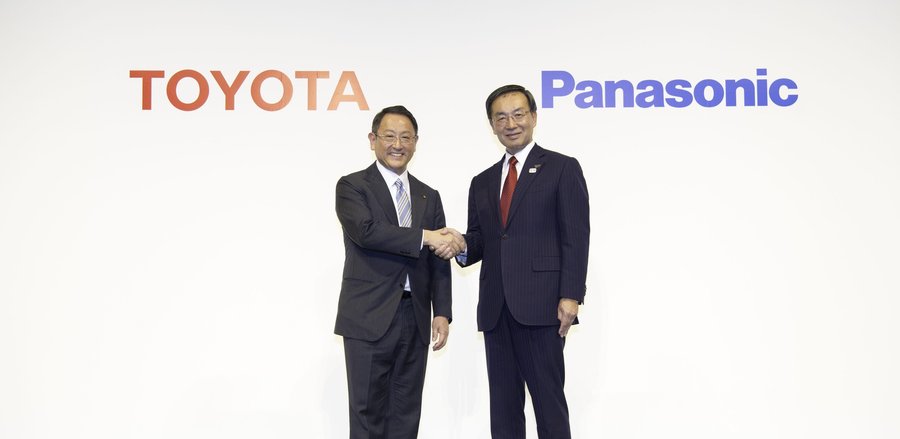Toyota Finally Has the Power in Electric Cars

Watch out, electric-car battery makers — Toyota Motor Corp. has arrived.
Asia's biggest automaker is setting up a joint venture with Panasonic Corp. to produce batteries for partners such as its Daihatsu unit, Mazda Motor Corp. and Subaru Corp. that together account for more than 20 percent of global car production. Toyota will own 51 percent of the venture, to be established by the end of 2020
Breaking Away
Panasonic's share price used to move in tandem with Tesla but has decoupled as it looks to new partners
For Panasonic, which supplies batteries to Tesla Inc., it's good news. The spreading of risk away from Elon Musk's company will relieve investors. Much of the Japanese company's future prospects — and renewed image — have been pinned to the U.S. electric-car maker. Tesla's production delays have hurt Panasonic, even if the battery segment accounts for only a fifth of its sales.
It's also a smart move for Toyota, which has been late to the electric-car race, focusing instead on futuristic technologies such as hydrogen fuel cells. As one of the world's largest carmakers, it needed to get on the electric bandwagon quickly, especially as it shifts to a higher gear in China. Panasonic had a 15 percent share of the electric-vehicle battery market as of 2017. While funding details were sparse, Toyota's deep pockets will help.
Flooding the Zone
With production climbing, the future of battery makers — especially smaller ones — may be bleak
Companies and subsidiaries that specialize in lithium ion batteries for electric cars have sprung up in recent years. From South Korean champions such as Samsung SDI Co. and LG Chem Ltd. to China's Contemporary Amperex Technology Ltd., or CATL, the list goes on. The rush to invest makes sense. Ultimately, the battery is the biggest cost of an electric car. Own that and, in simple terms, the rest of the car is effectively just a shell that goes over the top.
Car manufacturers produce only a fraction of an electric vehicle — most comes from parts makers. Take General Motors Co.'s Bolt, for example. The U.S. automaker produces 11 percent of the plug-in model, compared with 20 percent of its regular internal combustion engine cars.
Battery makers have been racking up big orders from carmakers — and passing on the costs of metals they use such as cobalt and nickel. If Toyota and Panasonic can get it right, that business model may no longer be feasible. Battery makers have struggled to control other factors such as margins, locations, sizes and volumes — as Panasonic's experience with Tesla has demonstrated.
All Downhill
The Chinese battery giants have been able to bring down the average selling price for batteries, but at the expense of their margins
The cost of making batteries widely affordable for consumers remains elusive. As CATL has shown, bringing down average selling prices means accepting waning margins (albeit from a fat starting point). It also requires increasing and unsustainable amounts of investment.
Bringing the process in-house will enable Toyota to cut costs, streamline operations and control the supply chain. The company is reverting to a time-honored Japanese practice. Carmaker partnerships and alliances of various stripes haven't shown any concrete results yet. They leave open the question of who ultimately owns the technology, and haven't addressed how they will deal with competition among partners in the same market, as we've written. But a venture with aligned and complementary interests could move must faster toward the affordable car of the future.
The power in the electric-battery market looks to be shifting in Toyota's direction with this latest venture.
Related News


